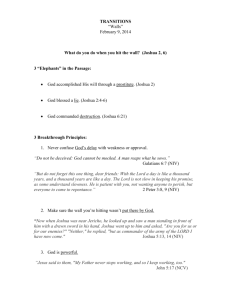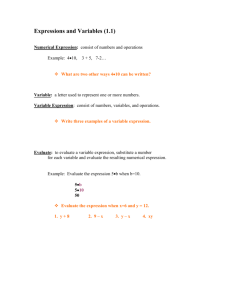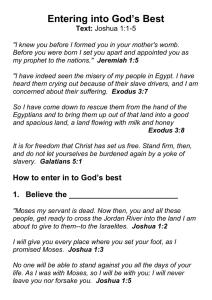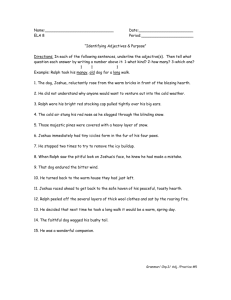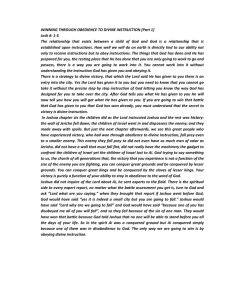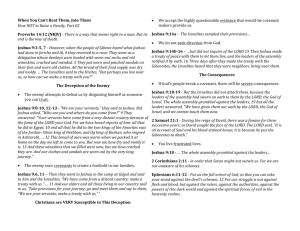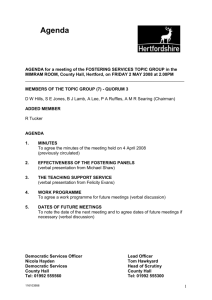Introduction to Inductive Bible Study
advertisement
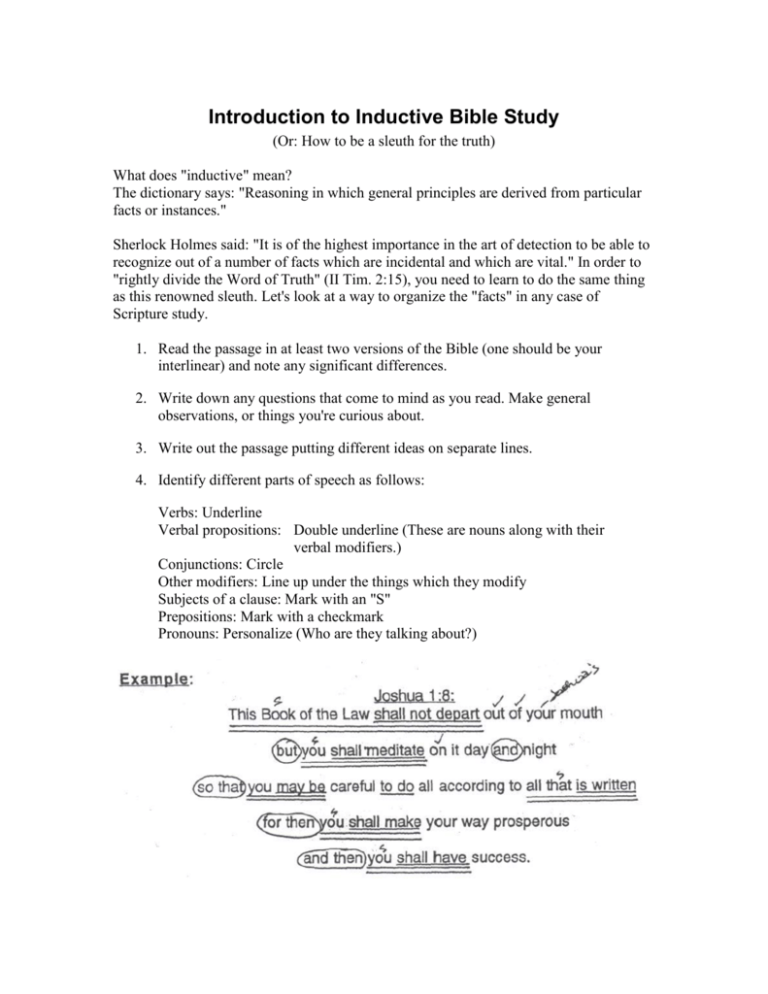
Introduction to Inductive Bible Study (Or: How to be a sleuth for the truth) What does "inductive" mean? The dictionary says: "Reasoning in which general principles are derived from particular facts or instances." Sherlock Holmes said: "It is of the highest importance in the art of detection to be able to recognize out of a number of facts which are incidental and which are vital." In order to "rightly divide the Word of Truth" (II Tim. 2:15), you need to learn to do the same thing as this renowned sleuth. Let's look at a way to organize the "facts" in any case of Scripture study. 1. Read the passage in at least two versions of the Bible (one should be your interlinear) and note any significant differences. 2. Write down any questions that come to mind as you read. Make general observations, or things you're curious about. 3. Write out the passage putting different ideas on separate lines. 4. Identify different parts of speech as follows: Verbs: Underline Verbal propositions: Double underline (These are nouns along with their verbal modifiers.) Conjunctions: Circle Other modifiers: Line up under the things which they modify Subjects of a clause: Mark with an "S" Prepositions: Mark with a checkmark Pronouns: Personalize (Who are they talking about?) Now that you've decided what some of the facts are, you need to observe the relationship between these parts to understand the whole. Knowing the facts doesn't, in and of itself, help you see the truth until you see how the facts fit together in some coherent way. Don't be like Dr. Watson when Sherlock tells him, "You see, but you don't observe." Help your observation along by: 5. Determining and identifying on your diagram: a. Main verbs and independent clauses: These are most often independent sentences with a complete subject and verbal complement. If there is more than one verbal clause, decide which you think is the most important one, the one that everything depends upon. (On your diagram, move the main verb and its complement to the left-hand margin.) b. Coordinate or subordinate verbal clauses: Usually these start with a conjunction and contain a verb (which you must have decided is not the main one). These verbs might be infinitives, participles or subjunctives. Coordinating or subordinating verbal clauses often express the "How?" or "Why?" of the main verbal proposition. (Indent these under the things they modify, moving less important, i.e.. subordinate, items further to the right on your diagram. c. Other modifiers or phrases: Prepositions begin these descriptive phrases (a phrase is different than a clause in that it contains no verb). These phrases describe the "Who?", "What?", "When?" and "Where?" of the main verbal proposition. (Line these up on your diagram under the things which they modify, indenting some items more to reflect your understanding of their relative importance.) Example: This Book of the Law shall not depart out of your mouth BUT you shall meditate on it day and night SO THEN you may be careful to do all according to all that is written FOR THEN you shall make your way prosperous AND THEN you shall have success. Now I'm going to reveal the secret to solving any mystery! ASK THE RIGHT QUESTIONS and, of course, conclude the right answers. Don't think you know something until you can prove it from the facts. This safeguards us from deluding ourselves into thinking that we understand a passage of Scripture if we recognize familiar components. Also, try not to take anything for granted. Another quote from our famous sleuth: Dr. Watson: "Is there any point to which you wish to draw my attention?" Holmes: "To the curious incident of the dog in the nighttime." Watson: "The dog did nothing in the nighttime." Holmes: That was the curious incident." Look for what's not there as well as what it. Every word means something, so why did the author put it in? Remember this author was truly divine and didn't make any mistakes. An example: Why is Jesus referred to in some places as "The Lord Jesus Christ", then others as 'The Lord Jesus Christ our Savior" and others as just "Christ"? (There was a different intended emphasis for different contexts.) Papyrus was rare in those days, and they didn't waste ink either so ask yourself "Why, why, why?" about everything. 6. Okay, you say, but how do I ask these vital questions? Well, I'm glad you asked!! First let's call your main verbal proposition the MVP and let's call the clause or phrase you're trying to understand the complement. Here's how to pose each question, plugging in the MVP where you see the first"..." and complement at the end "...". WHO Describes the one with whom the action has to do or effects. The one(s) to/for/by whom...is/are the... WHAT Usually answered by the direct or indirect object of the MVP. The content of the verb or the content of a prayer, petition, greeting, benediction, blessing, etc. Often the phrases in apposition to an idea are expressed by this "content1 nuance. (Appositional phrases: Means of modifying a noun or expression by placing an equivalent expression which repeats the meaning of the first word or phrase. Example: "the will of God, your sanctification".) The content of...is/consists of.. WHEN The time in which the action takes place. The time when/before/at during...is/was when/before/at. WHERE The place or sphere or arena in which the action takes place. The place at/from/to which...is at/from/to... HOW Means: Tells the instrument or agent vitally necessary to accomplishment of the MVP. Signaled by: from, by, by means of, because of, as a result of, about, for, through, with, etc. The means by which...is/was by... Manner: Describes the way something is done, but is not absolutely necessary - color commentary. Signaled by using adverbs: gently, meekly, lavishly, consistently, etc The manner in/by which...is/was by... WHY Purpose: Explains why someone does something from the standpoint of intention, plan or design; what went on in the mind of the subject before he did something. The purpose for...is/was so that... Reason: Gives grounds or motivation to do something. The reason for/that...is/was because/that... Result: Tells what happened at the end of the action or what actually happened. The result of...is/was that.. Now it's time to synthesize the answers to your questions into a succinct form that captures the author's thrust, emphasis or argument to the original audience (which implies you know who the original audience was and what the circumstances were of the writing!) Don't jump too quickly to interpret this in the 1990's light until we first understand the initial context in which it was written. 7. Use one of the nuances to start your summary and be sure to include a paraphrase of the MVP and'the most important modifying clauses or phrases. Here's an example using Joshua 1:8. This Book of the Law shall not depart out of your mouth BUT you shall meditate on it day and night SO THEN you may be careful to do according to all that is written in it. FOR THEN you shall make your way prosperous AND THEN you shall have success. A. MVP = Joshua shouldn't let the Word depart but should meditate B. The sphere in which Joshua should keep/not let depart the Word is his mouth. (This is a figure of speech implying more than just his mouth.) C. The time when he should meditate on the Word is day and night. (Another figure of speech implying all the time.) D. SVP (subordinate verbal proposition) = The purpose of meditating on the Word all the time is so that he'd carefully obey it. E. The manner in which he'd carefully obey is by obeying it all. F. The result of carefully obeying everything in the Law is that he'd prosper and be successful. 8. Now just take this one more step and put it in "pedantic" outline form. This helps you express the proper emphasis of the author ending with a summary at the top (I.) which is a one sentence statement reflecting your understanding of the passage. I. The result of Joshua constantly ruminating on the law and its implications for his life so that he'll be fully and accurately obeying it, is that he'll be in position for God to bless him. A. MVP = Joshua should meditate on the Law constantly A1. MVP = Joshua should keep and meditate on the Law. A2. The sphere in which he should keep it is his mouth A3. The time when he should meditate is all the time. B. SVP = The purpose for Joshua meditating on the Law constantly is so that he will be carefully to obey it all. B1. The purpose for Joshua meditating on the Law constantly is so that SVP = he will carefully obey it. B2. The manner in which he should carefully obey it is by doing everything in it.' C. The result of Joshua carefully obeying all the Law is that he'll be blessed (O.T. thought would be that God's sign of approbation is actually physical riches, land, family, etc.) C1. The result of Joshua carefully obeying all the Law is that he'll prosper. C2. The result of Joshua carefully obeying all the Law is that he'll have success. Okay, now don't do the "freaky-deaky". Yes, it is as hard as it looks, but it does get easier and more fun with practice and you can have all the remedial help you want. You're probably thinking "I could never do this." or "Why exert all this effort? Other people study the Bible without all this fuss." Careful! Don't rationalize yourself out of all the blood, sweat, tears, eventual ecstasy and rewards of finding out for yourself what the Scriptures say and being able to defend your perspective. Remember, if you want to be a follower of our Crucified Lord (a disciple) that means you have to follow his path accurately or you'll be wasting your time on a different path. And in order to follow accurately, you need to understand where the path is so you can obey it accurately. (Sound like a familiar verse from the book of Joshua?) No real student of the Scriptures ever said this should be easy!! Proverbs 2:1-5 says: My son, if you receive my words, and treasure my commands within you, so that you incline your ear to wisdom and apply your heart to understanding; yes, if you cry out for discernment, and lift up your voice for understanding, if you seek for her as silver and search for her as for hidden treasures, then you will understand the fear of the Lord, and find the knowledge of God. If treasure were lying around on the surface of the ground, then what is all the seeking and searching about in these verses? If we want to understand the fear of the Lord and find knowledge, we will have to put on our mining hats, descend into the mine shaft, throw light on things previously dark and spend alot of time sweating and digging to extract the real treasures hidden in it (not getting sidetracked by "fools gold"). For those still quavering, or saying "It's too hard!", just think of how you may be pursuing success in another area of your life. Apply that same diligence, sacrifice, effort, determination, overcoming of obstacles and other's expectations, to finding out the buried treasures the Lord has for the seekers. He even promises to descend with us into the dark, giving us all the right tools, injecting us with energy and encouraging us when we're feeling faint. Philippians 2:13: ...For it is God who works in you both to will and to do for His good pleasure. And remember, Philippians 4:13: / can do all things through Christ who strengthens me. 9. Now the last and perhaps most important step is to write out an applicational thought based on the extracted truth you've found in your search. Make it personal, make it real and not too mystical, make it practical for everyday living. Use Joshua 1:8 and state something you'll do or be differently as a result of what it says. Example: I will have a quality daily quiet time every day and begin to study the Scriptures systematically because I realize that without carefully obeying what God says to do, I can never be truly successful in this life or in the one to come. My measure will be at least 15 minutes each day (no less than 6 days a week) reading the Word and making notes in a journal. I will also engage in at least bi-weekly inductive studying of the Scriptures with others who can help me learn how to extract God's truth for myself. You'll also find it easier to achieve/apply what you've just stated if you have someone to keep you accountable for it. Make sure you pick someone who'll be willing to be challenging when you're not doing what you know you should and encouraging when need it! Trust me, this will be the adventure of a lifetime!!

